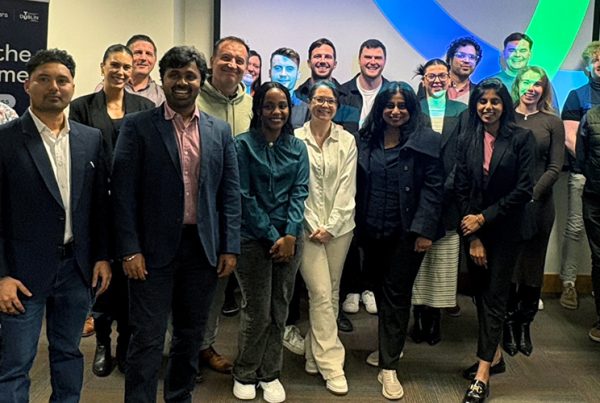

Amit Dash, the founder of RedOrange AI, has been taking part in the 2024 New Frontiers Accelerate programme. This is a brand new residential programme offering support to founders that are unable to take part in our full-time six-month Phase 2. We spoke to Amit about his journey so far growing a new startup.
Amit is a seasoned leader in the tech and cloud security landscape, bringing over 14 years of expertise to his latest venture. Known for his work in DevOps, DevSecOps, and cloud security and engineering, Amit has built a career solving security challenges for some of the most sensitive sectors, including finance, shipping, and SaaS.
Amit has been taking part in the 2024 New Frontiers Accelerate programme. Before RedOrange AI, he founded CaretCloud, a consulting firm dedicated to cloud security, where he helped clients navigate complex cybersecurity landscapes, creating solutions that kept sensitive data safe in an increasingly digital world.
 With RedOrange AI, Amit applies his philosophy of intelligent automation to compliance management. He believes compliance should be a streamlined, proactive process that leverages technology to reduce human error and help businesses navigate regulation without disruption. So, how will RedOrange AI help businesses keep up with the pace and complexity of today’s regulatory environment?
With RedOrange AI, Amit applies his philosophy of intelligent automation to compliance management. He believes compliance should be a streamlined, proactive process that leverages technology to reduce human error and help businesses navigate regulation without disruption. So, how will RedOrange AI help businesses keep up with the pace and complexity of today’s regulatory environment?
Protecting sensitive data across business types
Data protection and compliance have gone from back-office details to mission-critical operations for businesses of every size. For SMEs, protecting data could involve securing employee tax IDs, bank details, client contracts, and other essential records. These aren’t just numbers on a spreadsheet – they represent livelihoods, reputations, and customer trust. For larger corporations, the complexity increases. Massive databases filled with employee records, client account details, and sensitive consumer information such as health records or addresses are subject to stringent regulations.
Without a robust system, handling these types of sensitive information can be an operational nightmare, especially as businesses scale. RedOrange AI automates the gathering and securing of this data so that companies, regardless of size, can ensure it is protected and meets all compliance requirements. This isn’t just about data management; it’s about giving businesses the confidence that their operations and relationships are secure.
The complex world of compliance made manageable
When people hear the word “compliance,” they might be unclear what this entails beyond a general notion of rules and regulations. The business reality of compliance involves strict adherence to laws that govern data capture, use, handling, and storage. This is especially true in Europe, where General Data Protection Regulation (GDPR) sets some high standards in how companies collect and protect people’s personal data, requiring businesses to keep meticulous records and secure customer consent for data use.
Failing to comply isn’t just a legal risk but a financial one, with heavy penalties, potential shutdowns, and reputational damage at stake. RedOrange AI takes the guesswork out of this process by creating tools like its AI-Powered Compliance Wizard, which guides businesses in meeting requirements like GDPR as well as frameworks such as NIS 2, DORA, and SOC2. For the companies subject to such regulations, this means peace of mind and a much simpler, automated path to compliance.
Moving away from labour-intensive compliance processes
For too many organisations, compliance is a hands-on, resource-draining task. Teams often rely on spreadsheets, pieced-together records, and siloed systems to keep up with audits. With information spread across departments, tracking down evidence of compliance can take days, even weeks, of sifting through paper trails, emails, and isolated data.
In a healthcare setting, for example, staff might manually track each patient record’s compliance to ensure it meets HIPAA requirements – a time-consuming process prone to error. Finance departments face similar challenges, spending hours matching transactions to complex audit standards. A platform that centralises these tasks, automating evidence collection and compliance checks, will help businesses to prepare for audits in a fraction of the time, free from the manual errors that spreadsheets are known for and avoiding endless documentation hunting.
A solution based on real-world experience
The idea for RedOrange AI emerged from a data breach that Amit witnessed at the accounting firm that supported his company. The incident exposed major vulnerabilities, leading to fines, reputational damage, and months spent regaining client trust. As Amit and his team researched the root cause of the breach, evidencenced through scattered records, it became clear that traditional, manual compliance methods couldn’t keep up with growing regulatory demands.
This experience became the foundation for RedOrange AI. Amit saw an opportunity to develop a smarter, automated solution to simplify and strengthen compliance across different industries. The cloud-native tool will keep businesses secure, compliant, and prepared for any regulatory challenge without the headaches that come with manual compliance management.
Support from the Irish startup ecosystem
Amit’s startup journey has included support from the country’s vibrant startup ecosystem. As a highly technical founder with limited experience in scaling a startup, the tools and supports available to him have been more than welcome. In addition, the local tech community in Dublin has proved an invaluable resource for collaboration and networking opportunities.
Amit feels that Ireland is an ideal location for starting a business. Having previously worked with startups in the Bay Area, he finds that Ireland offers a similar environment for founders, making it an attractive place for innovation and growth. This supportive landscape has been instrumental for Amit. As he builds his team in Dublin, he remains committed to leveraging this supportive landscape to drive RedOrange AI’s growth and innovation.
What’s next for Amit and his startup?
The startup is currently looking for €600,000 in investment from angels or pre-seed venture capital firms. RedOrange AI will be partnering with Managed Service Providers (MSPs) and Managed Security Service Providers (MSSPs), as they specialise in understanding the compliance and security needs of their clients. By integrating a compliance platform into their offerings, these providers can enhance their service value, making compliance management more accessible to their clients. With the MVP live, Amit is currently onboarding the first clients. He will be actively growing the Dublin team, supporting and scaling the platform with sales and marketing professionals as well as adding to the engineering team.
On the product side, the team is enhancing the platform’s AI capabilities and developing powerful integrations to make compliance even more seamless. The ultimate goal is to create a self-learning compliance engine that adapts to evolving regulations, keeping clients ahead of the curve. By continuously refining the product, RedOrange AI is setting itself up to be a long-term partner for businesses, enabling them to confidently navigate an increasingly complex regulatory landscape.
To learn more about the company, visit redorange.ai.
About the author
 Scarlet Bierman
Scarlet Bierman
Scarlet Bierman is a content consultant, commissioned by Enterprise Ireland to fulfil the role of Editor of the New Frontiers website. She is an expert in designing and executing ethical marketing strategies and passionate about helping businesses to develop a quality online presence.
Recent articles

Raise Your Startup’s Visibility & Credibility By Entering These Competitions

Founder Perspectives: Lessons From Building Businesses In Sustainability

Tech Startups In The Age Of AI: Alumnus Paul Savage On Speed, Quality & Risk

Fourteen Startup Founders Graduate From Phase 2 Of New Frontiers In Tallaght

Eleven Founders Graduate From New Frontiers In The Border Mid-East Region

Laying The Right Groundwork Helps Startups Prepare For Export Success

Startup In Dublin: Learn More About New Frontiers On TU Dublin’s Grangegorman Campus

 Scarlet Bierman
Scarlet Bierman
 Donal Kerr
Donal Kerr

